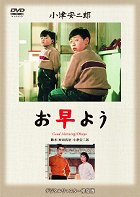Rendező:
Yasujirô OzuOperatőr:
Yûharu AtsutaZeneszerző:
Toshirô MayuzumiSzereplők:
Keiji Sada, Yoshiko Kuga, Chishû Ryû, Kuniko Miyake, Haruko Sugimura, Haruo Tanaka, Eijirō Tōno, Taiji Tonoyama, 三好栄子, Mutsuko Sakura, Fujio Suga (több)Tartalmak(1)
Good Morning (Ohayo) is the story of two young boys in suburban Tokyo who take a vow of silence after their parents refuse to buy them a television set. Shot from the perspective of the petulant brothers, Good Morning is an enchantingly satirical portrait of family life that gives rise to gags about romance, gossip, and the consumerism of modern Japan. (forgalmazó hivatalos szövege)
(több)Recenziók (1)
Good Morning is the best and most adorable movie about farting in the history of cinema. The traditional moronic elevation of the supposedly high-brow in comparison with the contemptible low-brow caused, among other things, comedies to be overlooked in Ozu’s filmography for many years. Not only does Good Morning fully deserve to rank among the director’s best works alongside universally acclaimed melancholic classics like Tokyo Story and Banshun, but it also fundamentally completes the image of the glorified grandmaster. Ozu was not a filmmaker who just wanted to repeatedly wallow in emotion over the beauty of transience and the passive tragedy of life. Or rather, that was only one side of him. As a boisterously playful filmmaker who finds beauty in ordinary, everyday life and baseness, Ozu stood in opposition to that. Good Morning was not a misguided return to Ozu’s beginnings in lighter genres (after all, he made gangster flicks as well as comedies), but one of his best works, made when he was at the absolute peak of his powers. The master’s refined style of stark static shots and frontal compositions is shown here not as an ascetic signature with strict or binding rules. On the contrary, its universal nature and the possibility of effectively using it to meet the needs of visual and carefully constructed comedy are revealed. Among other things, Ozu makes fun of the uniformity of the post-war suburbs and the tottering superficial morality found there. At the same time, he still finds beauty and humorous tragedy in the contrast of childish boisterousness and its clash with adult supposed authority figures, rules and the principles of communication that form the absurd connective tissue of society and the basis of bonds between people. In addition to that, the individual etudes and narrative lines, tied to various characters from the middle-class suburbs, portray the transformations in post-war Japanese society and the contemporary widening gap between the lifestyles and values of the elderly, middle-age and adolescent generations with an astonishing blend of satire and melancholy.
()

